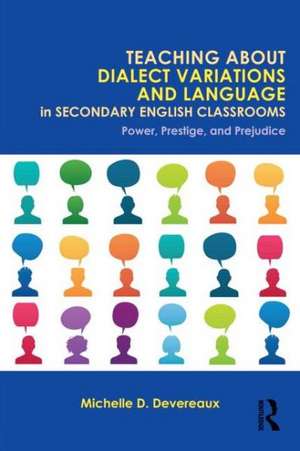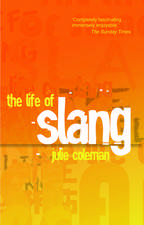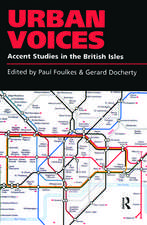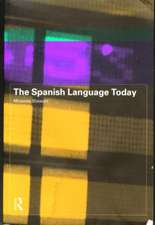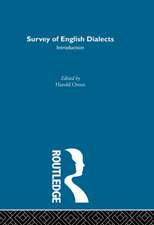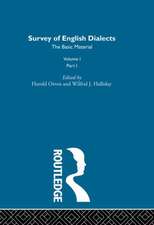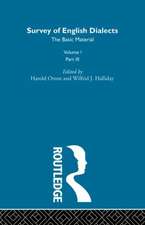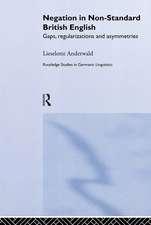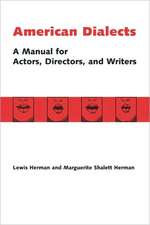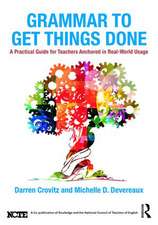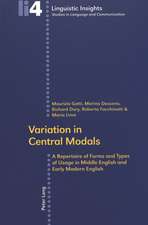Teaching About Dialect Variations and Language in Secondary English Classrooms: Power, Prestige, and Prejudice
Autor Michelle D. Devereauxen Limba Engleză Paperback – 29 oct 2014
| Toate formatele și edițiile | Preț | Express |
|---|---|---|
| Paperback (1) | 483.23 lei 6-8 săpt. | |
| Taylor & Francis – 29 oct 2014 | 483.23 lei 6-8 săpt. | |
| Hardback (1) | 1163.63 lei 6-8 săpt. | |
| Taylor & Francis – 4 noi 2014 | 1163.63 lei 6-8 săpt. |
Preț: 483.23 lei
Nou
Puncte Express: 725
Preț estimativ în valută:
92.51€ • 95.19$ • 77.98£
92.51€ • 95.19$ • 77.98£
Carte tipărită la comandă
Livrare economică 01-15 martie
Preluare comenzi: 021 569.72.76
Specificații
ISBN-13: 9780415818469
ISBN-10: 041581846X
Pagini: 176
Ilustrații: 50 black & white tables
Dimensiuni: 152 x 229 x 15 mm
Greutate: 0.32 kg
Ediția:New.
Editura: Taylor & Francis
Colecția Routledge
Locul publicării:Oxford, United Kingdom
ISBN-10: 041581846X
Pagini: 176
Ilustrații: 50 black & white tables
Dimensiuni: 152 x 229 x 15 mm
Greutate: 0.32 kg
Ediția:New.
Editura: Taylor & Francis
Colecția Routledge
Locul publicării:Oxford, United Kingdom
Cuprins
Contents
Preface
Acknowledgements
Chapter One: Introduction
UNIT ONE: LANGUAGE IDEOLOGIES
Chapter Two: Introduction to Language Ideologies
Chapter Three: Language and Power
Chapter Four: Language and Society
Chapter Five: Language and Identity
UNIT TWO: CODE-SWITCHING AND CONTRASTIVE ANALYSIS
Chapter Six: Code-Switching
Chapter Seven: Contrastive Analysis
UNIT THREE: PUTTING IT ALL TOGETHER
Chapter Eight: Putting It All Together: A Unit Plan
Epilogue
Appendix A: Common Core State Standards
Appendix B: Patterns in Dialects: African American English, Chicano English, and Southern English
Index
Preface
Acknowledgements
Chapter One: Introduction
UNIT ONE: LANGUAGE IDEOLOGIES
Chapter Two: Introduction to Language Ideologies
Chapter Three: Language and Power
Chapter Four: Language and Society
Chapter Five: Language and Identity
UNIT TWO: CODE-SWITCHING AND CONTRASTIVE ANALYSIS
Chapter Six: Code-Switching
Chapter Seven: Contrastive Analysis
UNIT THREE: PUTTING IT ALL TOGETHER
Chapter Eight: Putting It All Together: A Unit Plan
Epilogue
Appendix A: Common Core State Standards
Appendix B: Patterns in Dialects: African American English, Chicano English, and Southern English
Index
Notă biografică
Michelle D. Devereaux is Assistant Professor of English and English Education, Kennesaw State University, USA.
Recenzii
"This book introduces current and future teachers of secondary English to a revolutionary and linguistically sound approach to addressing dialect diversity in their classrooms, complete with detailed lesson plans and clear explanation of how the material fits the Common Core State Standards."
Michael Shepherd, California State University, Fresno, USA
"Devereaux conveys linguistically informed ideas about language in the classroom via practical, classroom-tested unit plans and lessons. She does more than pay lip service to language variation by demonstrating how language cannot and should not be moralized, revealing ways to empower students—not only linguistically but also academically and socially— and to truly celebrate linguistic diversity. With a foot in both the high school classroom and the university classroom, the author provides clear background information on language ideologies; by clearly explaining and situating these concepts, this book promises to transform how teachers approach language in our classrooms."
Kristin Denham, Western Washington University, USA
Michael Shepherd, California State University, Fresno, USA
"Devereaux conveys linguistically informed ideas about language in the classroom via practical, classroom-tested unit plans and lessons. She does more than pay lip service to language variation by demonstrating how language cannot and should not be moralized, revealing ways to empower students—not only linguistically but also academically and socially— and to truly celebrate linguistic diversity. With a foot in both the high school classroom and the university classroom, the author provides clear background information on language ideologies; by clearly explaining and situating these concepts, this book promises to transform how teachers approach language in our classrooms."
Kristin Denham, Western Washington University, USA
Descriere
Offering resources for secondary English teaching that respect students’ language varieties as strengths on which to build, this text shows how to move from traditional correctionist techniques to a linguistically informed approach to dialects in the classroom.
